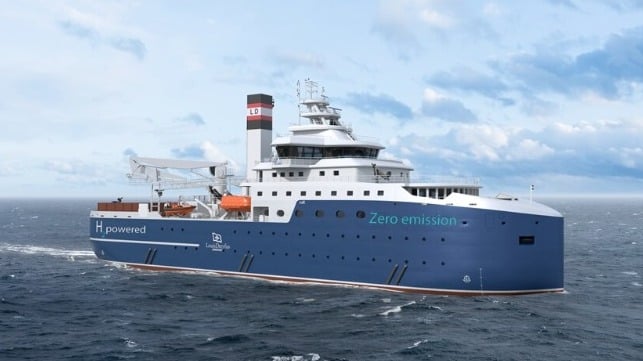Louis Dreyfus Obtains AiP for its Hydrogen-Powered SOV Design

The French shipping company Louis Dreyfus Armateurs (LDA) has received an Approval in Principle for its new liquid hydrogen-based SOV design. The Level 1 AiP was given by Bureau Veritas Marine& Offshore. This brings the groundbreaking Service Operation Vessel (SOV) design closer to reality.
The 100% hydrogen-powered SOV will be able to operate 95 percent of the time with zero carbon emissions during standard operations. This will lead in a reduction of an estimated 4,000 tonnes of annual CO2 emissions. The vessel will have capacity to accommodate up to 90 technicians for up to 14 days at sea, eliminating the need for additional offshore infrastructure. Refueling has been streamlined, as bunkering can be completed in six hours using trailers, eliminating the need for high-cost port facilities.
LDA introduced the hydrogen SOV concept design back in March 2024, in cooperation with Norwegian naval architecture company Salt Ship.
“We believe in developing purpose-built SOVs tailored to specific projects and needs. We are already offering alternative fuel options such as full electric and dual-fuel methanol. We firmly believe that hydrogen will be one of the options in the near future. This AiP represents a key step in making hydrogen-powered maritime operations a reality,” said LDA.
Other projects working to develop liquid hydrogen-powered vessels include the H2ESTIA Project, led by the Dutch innovation company NIM and supported by the Dutch government. The project launched last month, and aims to design, construct and demonstrate a hydrogen-powered bulk vessel to operate in the North Sea and beyond. The short-sea and inland shipping company Van Dam Shipping will manage the vessel.

that matters most
Get the latest maritime news delivered to your inbox daily.
However, in its bi-annual 2025 Hydrogen Market Outlook report this week, BloombergNEF indicated that the hydrogen sector has been in decline. “Costs have remained high and demand stayed low as a result. Policy has failed to bridge the gap between prices suppliers need to build viable projects and the prices buyers need to get justifiable business case. As a result, investments in the sector fell in 2024, with developers canceling projects,” said Martin Tengler, Head of Hydrogen Research, BloombergNEF.
But Tengler believes a rebound could be expected in places such as Europe, China, Japan and South Korea, where there are incentives offering developers opportunities for investment.
